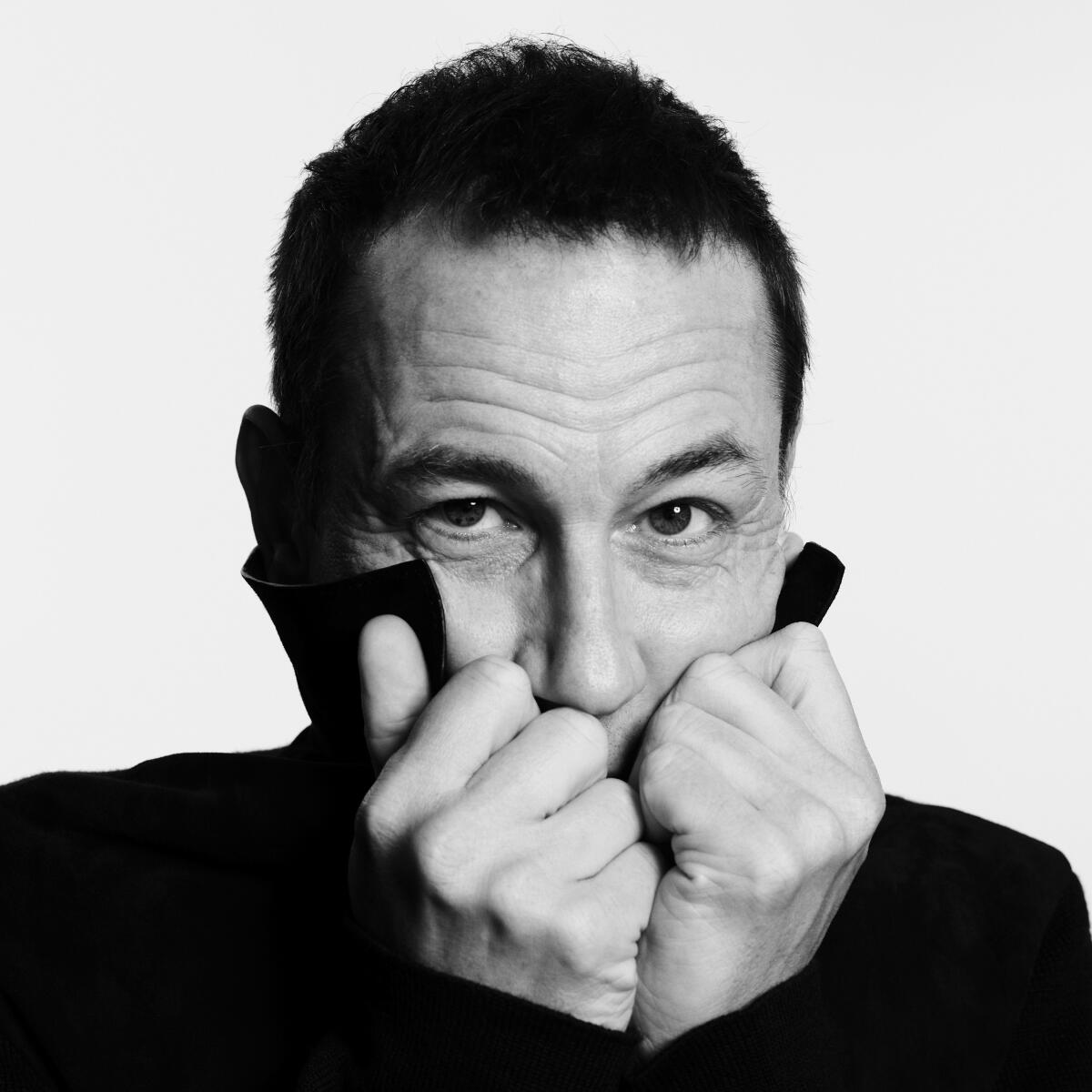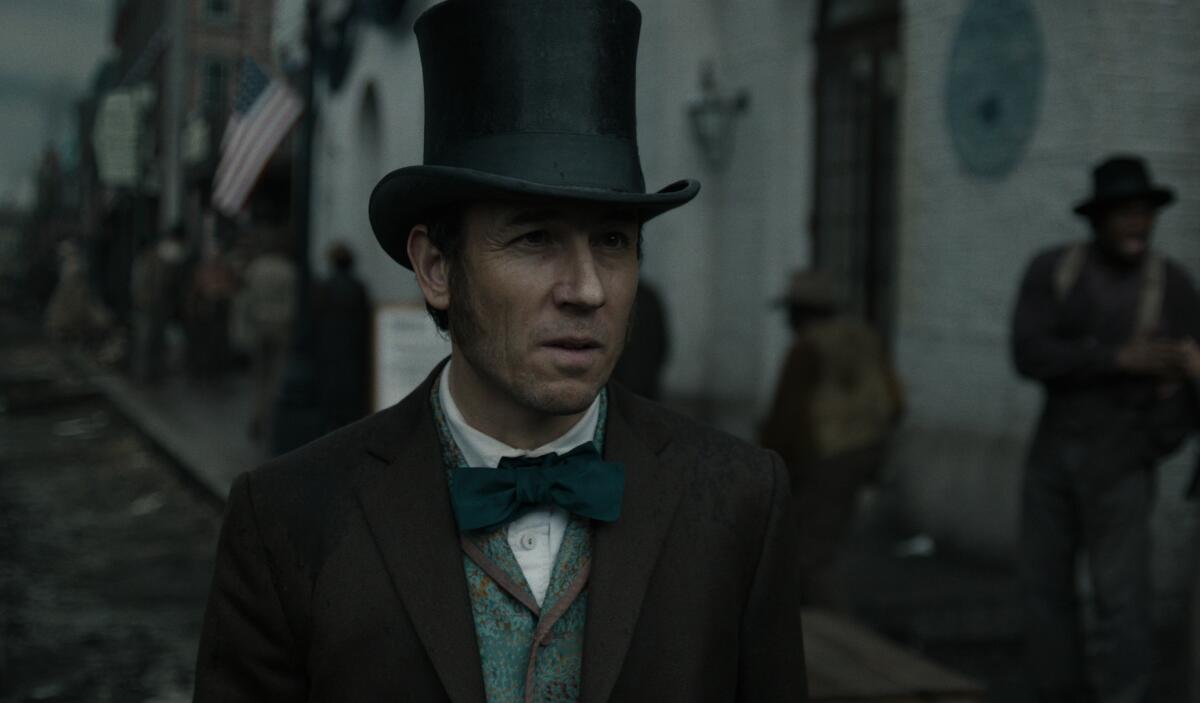‘Manhunt’ star: Lincoln’s assassination is still a call to protect democracy

- Share via
In “Manhunt,” the Apple TV+ miniseries about the hunt for John Wilkes Booth in the wake of the assassination of President Abraham Lincoln, Tobias Menzies plays Secretary of War Edwin Stanton as an immovable but vulnerable force, marching forward sadly, angrily, but most of all steadily. It was Stanton, one of Lincoln’s former rivals, who led the charge to track down Booth (played in the series by Anthony Boyle), while also fighting to keep Lincoln’s Reconstruction plans in place. Moving inexorably forward, through Confederate sympathies and the asthma that would ultimately claim his life, Menzies’ Stanton rarely allows himself a smile; he’s wound tight, often working his jaw into a faint grimace. He means business.
The real Menzies, too, comes across as quite serious, but also friendly and thoughtful, especially when discussing his craft. Known to American audiences through series including “The Crown,” “Game of Thrones” and “Rome,” Menzies is also a creature of the stage; when we spoke he had recently finished starring in “The Hunt,” adapted from Thomas Vinterberg’s film of the same name, at St. Ann’s Warehouse in Brooklyn. “What’s great about theater is that it keeps you very honest,” he said from his London home, a nondescript baseball cap perched atop his head. “It’s very clear when something is working and when the atmosphere in the room is starting to really get electric, and it’s very clear when it’s not that.”
An adaptation of James L. Swanson’s 2007 book, this Apple TV+ series focuses on Secretary of War Edwin Stanton, played by Tobias Menzies, as he hunts down Abraham Lincoln’s assassin.
Menzies gives the impression of someone who is always thinking, onscreen and off-; one of the thrills of “Manhunt” is watching the wheels turn inside Stanton’s head, and how those wheels then determine what appears on his face: consternation, resignation, outrage, occasionally even satisfaction. This is no accident. In preparing to play Stanton, Menzies took his own crash course in stoics of the American screen, including Gregory Peck in “To Kill a Mockingbird” and Henry Fonda in “12 Angry Men.”
“What I love about Fonda is he’s an amazing exponent of thinking on camera,” Menzies said. “You really can watch his face and watch his eyes and have the sense that you know what’s going on and what he’s thinking, which is sort of magical. I certainly tried to use that as a template, or reached for that as best I could.”
Born in London and raised in a rural area of southeast England, Menzies never really studied the Civil War era in school, or U.S. history in general. “I learned about Henry VIII more than once,” he said. But he was always drawn to the photography of Matthew Brady, who is mentioned in “Manhunt” and whose images of the war brought the conflict home to people around the world. “He gave us this incredible set of images, which made it so vivid and so close to us,” said Menzies. “The men look like us in different clothes.”

Before beginning “Manhunt,” he read Doris Kearns Goodwin’s “Team of Rivals,” the story of how Lincoln formed his cabinet from men with whom he didn’t always agree (including some he’d defeated for the Republican presidential nomination), and watched “The Civil War,” Ken Burns’ epic documentary series. He wanted to get an idea not just of what made Stanton tick but also of the political climate of the time, the stakes of the war and how easily it could have gone the other way. He was surprised to learn that the Lincoln assassination was part of a larger coup attempt, dramatized in the series, that also included assassination plots against other cabinet members.
In the process, he began to think about the tenuousness of the political system so many take for granted.
“Democracies are not bulletproof,” he said. “They have to be defended. I suppose it does feel like an interesting story to be telling at a moment when democracy is under attack in many parts of the world, including in the States. For that reason the series feels alive. Democracy still has to be worked at.”
Since England’s royal family shares so little of their personal opinions, actor Tobias Menzies relies on the script to explore Prince Philip.
But Menzies is, above all, passionate about acting. He talks about the “flow state” of the theater: “If the play is good and you’re in the right place, you can really get delivered emotionally and physically to where you need to be, so you don’t get that sort of fragmentary quality of filming.” Near the end of the interview he reflects on the interview process itself, and how it relates to performance.
“It’s such an inside-out, third eye kind of thing, talking about oneself,” he said. “In that way, it’s quite like acting. There’s the internal monitor of it: How does it feel here? But you can’t completely disregard how it looks on the outside, so you’re constantly flicking between those two, and you have to get the right balance.
“It’s such an interesting art form in that way, because you are reliant on feedback loops, be that a director giving you notes or an audience giving you feedback. You are constantly flying blind, but you have an antenna within you, which I think gets more sophisticated as you get more experienced.”
More to Read
From the Oscars to the Emmys.
Get the Envelope newsletter for exclusive awards season coverage, behind-the-scenes stories from the Envelope podcast and columnist Glenn Whipp’s must-read analysis.
You may occasionally receive promotional content from the Los Angeles Times.











